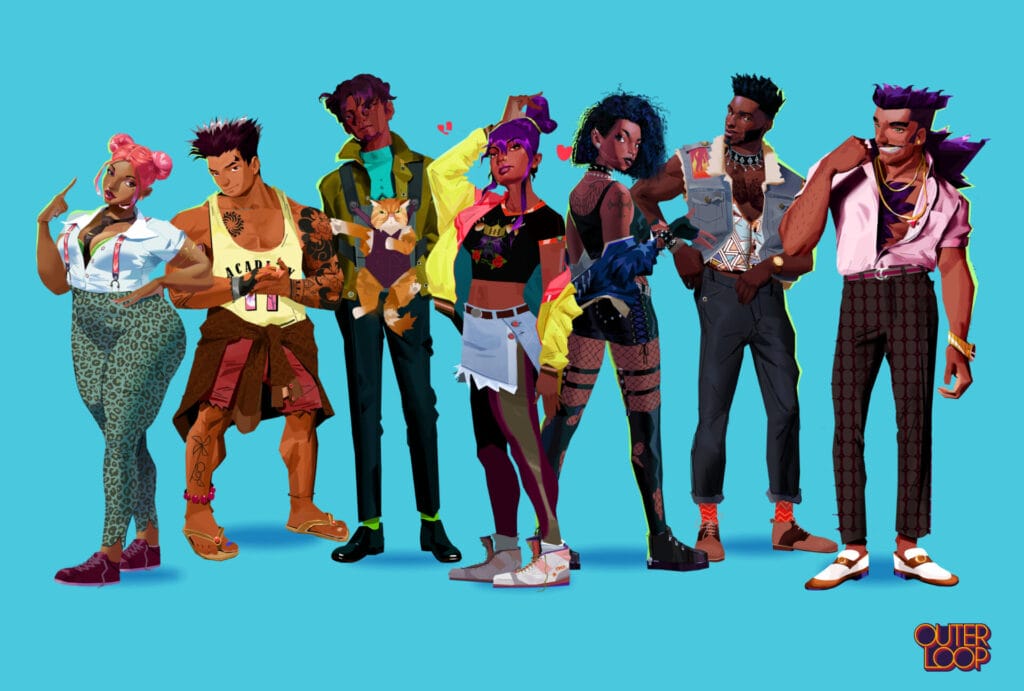Thirsty Suitors is one of video gaming’s finest explorations of South Asian culture, queerness, and relationship turmoil, but its success in telling a genuine, heartfelt story didn’t happen by accident. It was the achievement of the hardworking developers at Outerloop Games who are dedicated to creating smaller games with big themes, often spotlighting communities that have been pushed aside or left behind. With Dosa Divas on the horizon, currently slated to release in 2026, the team is preparing to serve up an entirely new world while keeping the same fearless spirit that defined their previous hit.
We spoke with Chandana Ekanayake, one of the co-founders of Outerloop Games, about the magic behind Thirsty Suitors’ authenticity, the importance of specificity, and the power of indies to tell fresh new stories in video games.
This interview transcript has been edited for length and clarity. All photos courtesy of Outerloop Games.
Annabelle Cook, GLAAD Gaming: One of the first questions I like to ask those I get to chat with is, if you could pick one game you hold nearest and dearest to your heart, what would that game be?
Chandana “Eka” Ekanayake: Oh man… Well actually, I do know this ’cause it’s the game that made me realize, “Oh, there’s people that actually make this,” and there might be some career in it. It’s a game called Full Throttle that Tim Schafer directed when he was at LucasArts. It was cinematic for an adventure game and it was one of the few games I played that had a woman character that wasn’t just there for the male characters. She actually had depth, her own motivations, and her own needs and I was like, “Oh, this is cool. It feels like a movie, but also done in a way that makes sense for the gaming environments.” And it was animated really well. Amazing writing and pacing. Just funny and dramatic and all the things I like in the games I play and movies I watch.
Cook: I like to ask that question because it gives me a sense of the type of games that creators first fall in love with, especially since you have such a history in video games. At this point you have two and a half decades of experience in the video game industry?
Eka: Yeah, I think it’ll be thirty years next year.
Cook: Well, there you go. You’re a video game industry veteran, but your foray into Outerloop Games is certainly a little newer. Obviously the studio was founded in 2017, the team releases the first game Falcon Age in 2019, and then Thirsty Suitors in 2023. I have to ask – how do you pivot from a VR title set in this lonely, desolate, sci-fi world to this bombastic title that takes mundane topics and cranks everything up to eleven?
Eka: We started the studio in 2017 – me and my two cofounders had previously worked together at an indie company. VR was a thing then and I saw that as an opportunity to do my own games. Falcon Age was designed around what would be interesting in VR. I’ve always been interested in character-driven stories, and while Falcon Age is sci-fi and set in a fictional place, it’s very much about British imperialism and immigration, and those kinds of themes still carry into Thirsty Suitors and Dosa Divas. I knew one of the things I wanted to focus on starting Outerloop was these themes and types of characters I didn’t see a lot of. I’ve always enjoyed doing comedy in games and I think it’s hard doing good comedy in games, so when we were figuring out what Thirsty Suitors was gonna be, there were a lot of opportunities to do interesting and dramatic things. It goes all over the place, for sure.
Cook: I was going to say that ironically Thirsty Suitors is even more out of this world than Falcon Age, but Outerloop Games has established itself as a studio that is making games that are larger than life while also tackling a lot of very real and pertinent topics. It seems like that is an intentional focus of the studio.
Eka: Yeah, definitely. It’s like…how do we tackle generational trauma, queer characters, and acceptance and non-acceptance – and all sorts of different perspectives – but also do it in a fun and interesting way? I love making games, and I always kind of think about, “How do we make this engaging and interesting while telling this story?” In Thirsty Suitors when you start battling someone, it’s really about resolving an argument with someone that you’ve had a romantic relationship with, and how we visualize that into an interesting visual, animated space. That’s why it becomes a battle in a bigger-than-life world because each of the exes has their own space.
Cook: That was one of the things we loved about the game here at GLAAD because the game manages to have a lot of critical conversations about weighty topics concerning family, culture, and queerness, but the tone is never dark or somber. Considering the state of the world, Thirsty Suitors was especially refreshing since the media sometimes depicts trauma as an essential aspect of these topics.
Eka: It makes for good writing when you focus on trauma, but we were intentionally like, “Can we do that and set the tone, but also celebrate and be joyful?” And that took a lot of iterations to figure out. We have to earn the scenes, right? We have to earn the moments. Anime does a great job at this. You can have really bombastic and fun moments and you can have really dark and quiet, poignant moments. In a game sense, we try to take the player with us, set the tone, and set the space properly for it, and hopefully that came across, and it seems like people got what we were trying to do with Thirsty.
Cook: Well, Thirsty Suitors is obviously the studio’s most recent release, and part of the fun storytelling is that when you start up the game, you find out that the main character Jala – and I say this lovingly – is kind of a hot mess.
Eka: She’s such a hot mess!
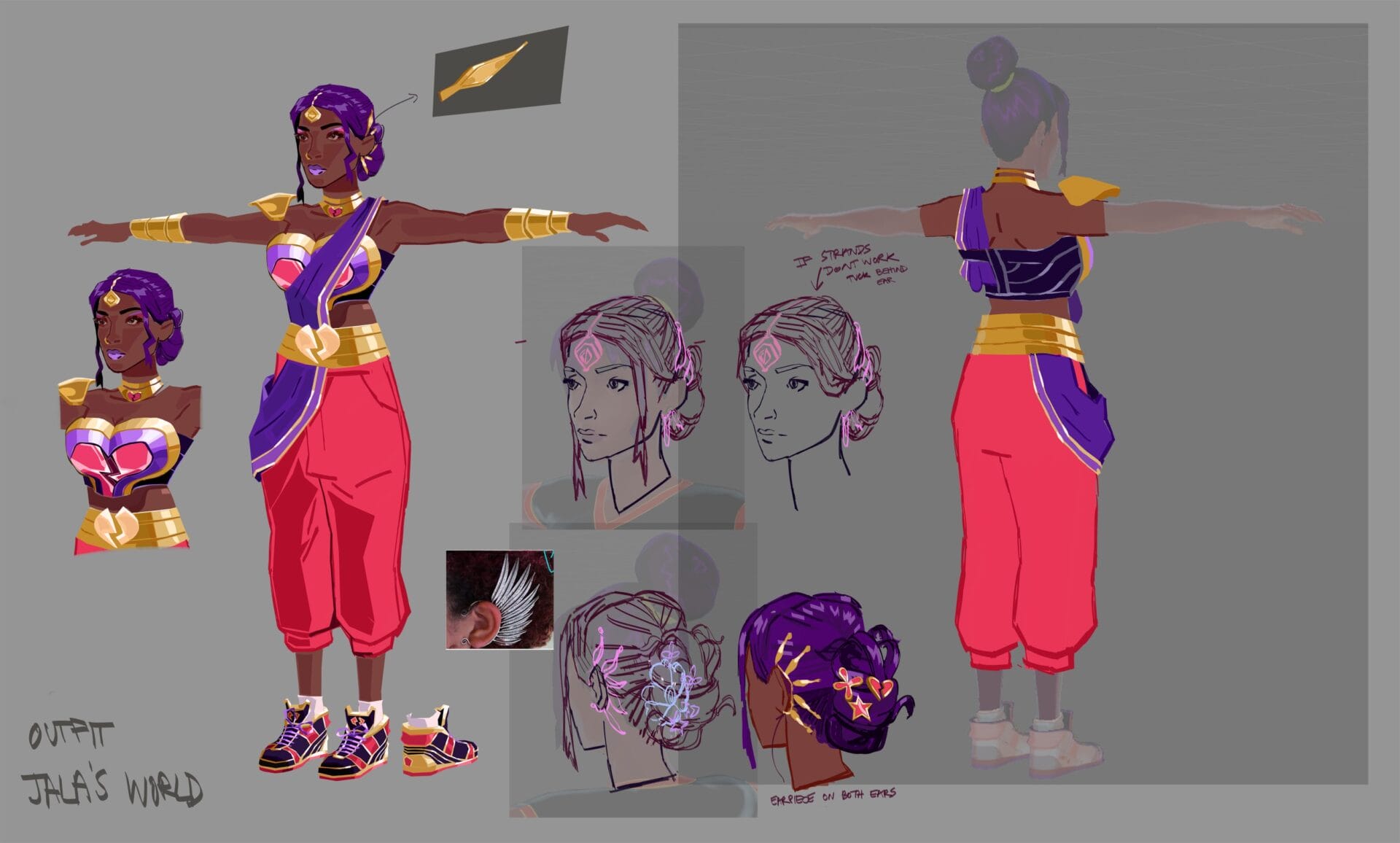
Cook: And there must be a lot of thought that goes into making a character through which the players will experience your world. I’d love to hear about how your team decided on a main character like Jala who really isn’t perfect and isn’t always in the right.
Eka: I think we as humans and people are messy. We like stories about messy people. We can relate to them. We can relate to what they do well, what they don’t do well, best intentions but how we behave… Simply, I was like there aren’t enough messy, brown women in games. I think Never Have I Ever was just coming out while we were in development and that was cool to see. So things like that were intentional. Jala’s not perfect, she doesn’t know what the hell is going on and she’s trying to figure it out, and she hasn’t made great decisions in her life. Coming back to your childhood home after a breakup is pretty tough.
Cook: Well, speaking of her breakups, the team designed exes of different genders for Jala. Was it established from the beginning with the team that she was going to be bisexual or was that aspect of her character realized further into development?
Eka: There are a lot of different types of folks on the team. It wasn’t even like a “should we make her bisexual or not make her bisexual” choice but it was just a thing that made sense for us to do for the story. And initially when the game was conceived, I was like, “I think I want to do a game about arranged marriage, make it a card-based game, and call it Thirsty Suitors.” So the suitors idea was there. We didn’t know it was going to be exes until much, much later, about a year into pre-production. When we release a game and players play it, the hope is that everything fits together in a way where they are like, “The studio designed it perfectly. It’s the only way it could be.” But there are so many iterations and that’s why games take years.
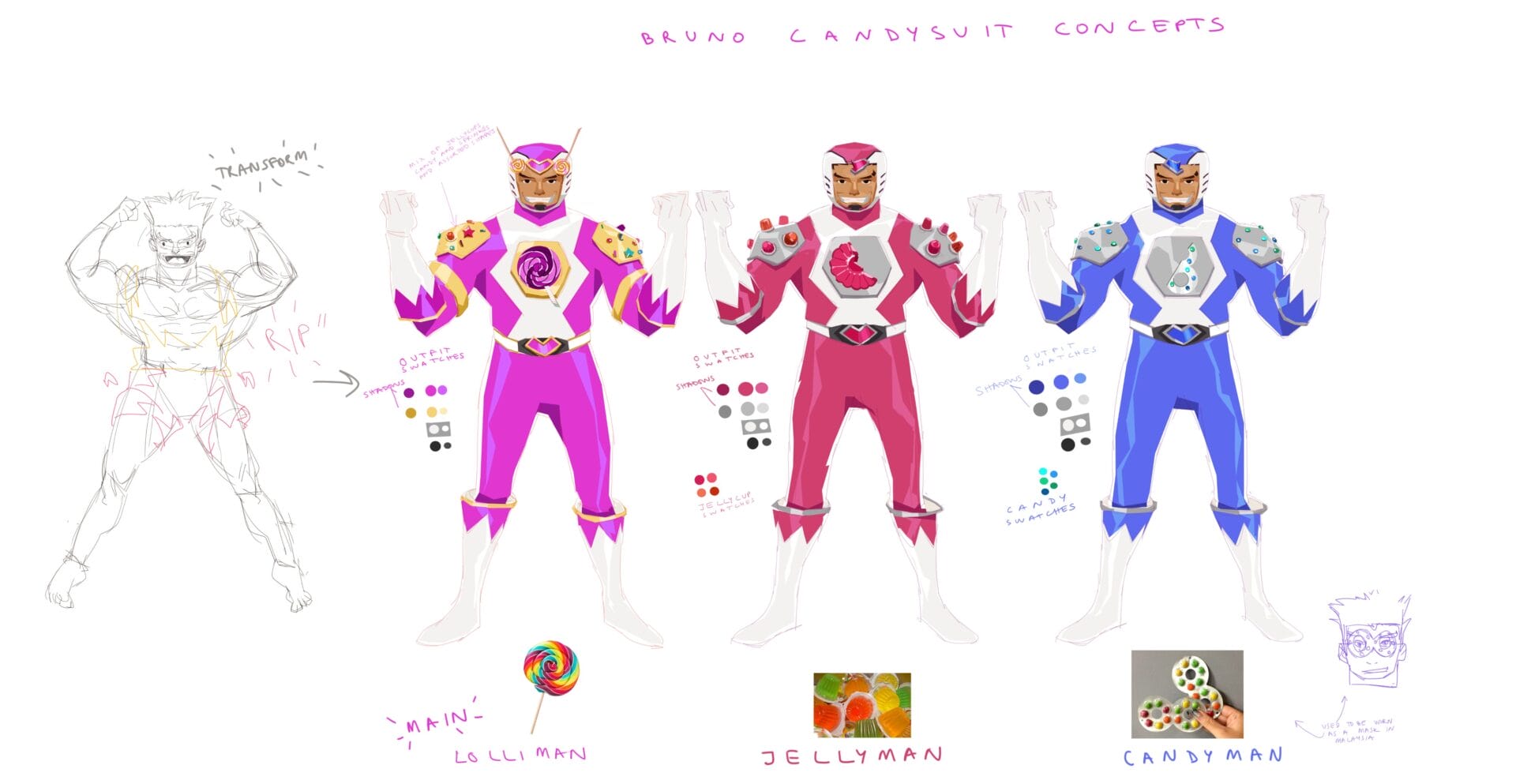
Cook: They don’t see the closet of all the ideas that never made it.
Eka: No! It started really rough and not great. Initially, Jala was coming back home for her sister’s wedding – I think it was her cousin at that point – and her parents were going to set her up with a bunch of suitors from India and that was the setup. The suitors that your grandma sends after you in town – that’s the remnant of that. And then we were like, “How do we make this more interesting for her?” And then it was like, “Well, what if it was just her exes?” And once we had that structure, it was just like, “Okay, how many exes, how do we set them apart from each other, and then contrast them with Jala?” Each of the exes were designed to represent different parts of Jala, and for her to forgive herself and herself on her road to redemption. And the player is learning about Jala’s history at the same time Jala is because her memory of each relationship is very different to what her exes’ memories are. I grew up in Sri Lanka and Meghna (the head writer of Thirsty Suitors) grew up in India, and we’re both immigrants, but neither of us have ever gone through arranged marriage and neither of us could speak directly to it, so we decided not to do it. We were being so specific that we should know how it feels to go through arranged marriage if we’re going to make a game about it and neither of us could so we decided to focus just on Jala’s relationships.
Cook: I want to return back to the topic of suitors that Paati sends, but you said something first that I want to touch on which is about making characters very specific to lived experiences. I think we’ve found that some games with queer and South Asian characters, especially in the AAA space, can sometimes standardize or sanitize their content to gain mass appeal, but in doing so, they create characters that are strangely difficult to relate to because they’re so broad and vague. Thirsty Suitors does the complete opposite. Characters have very specific cultural identities and very personal and specific experiences with their family and, when applicable, with their queerness, which makes them feel a lot more relatable.
Eka: Which is weird, right? You think that if I’m trying to appeal to a bigger audience, I should make them more general, but really I find that the more specific you are with a place, world, or character, they appeal because it feels like there’s depth and I can understand what they’re going through even though I might not have the same personal experiences. That’s a thing we kept saying to ourselves: specificity is universal and we need to do a good job at being specific and intentional with each of our characters.
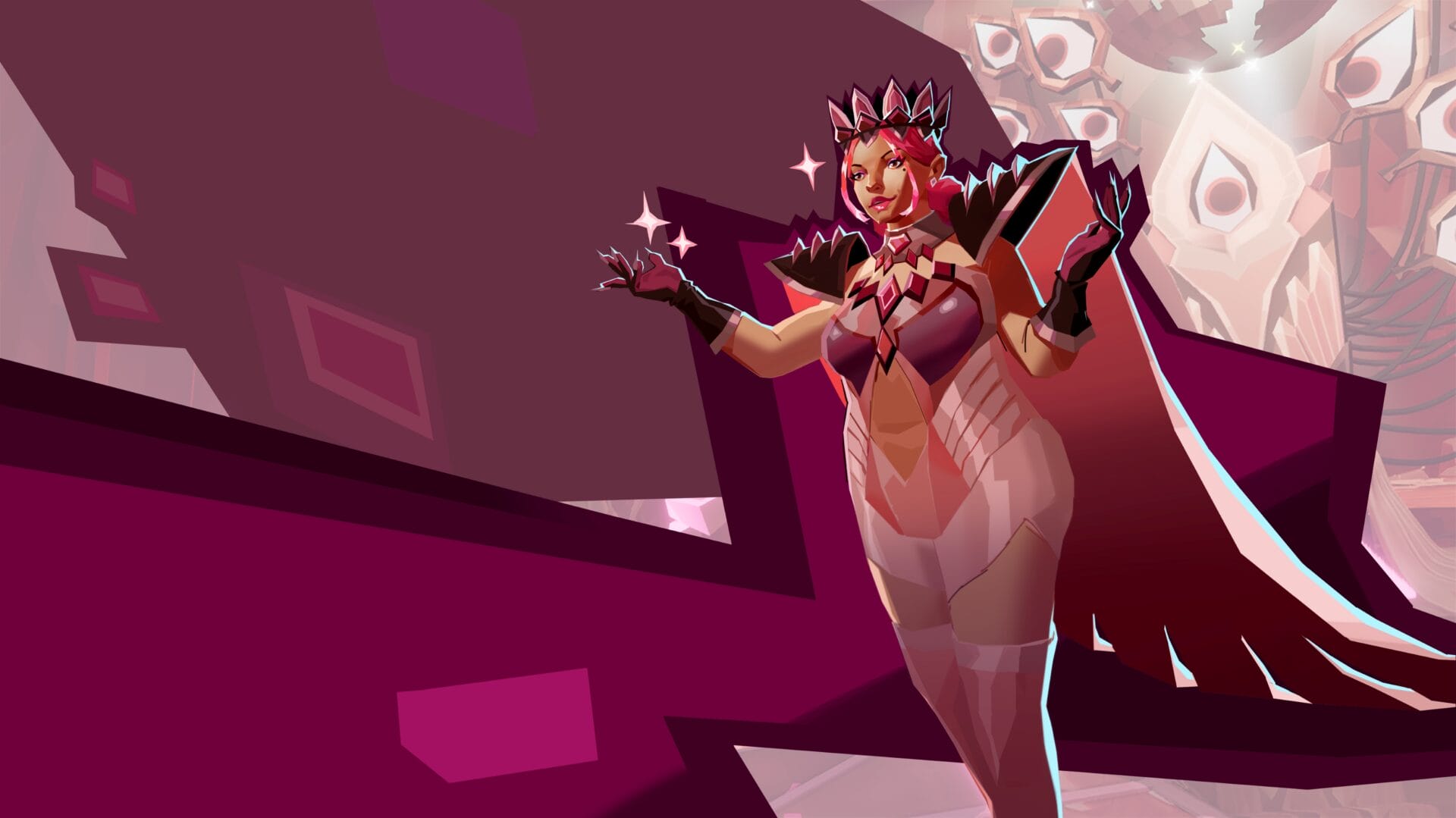
Cook: And another thing that players are used to is the “one and done” method with representation. Games often have a singular character that represents an entire group of people as a whole and that’s what players are used to getting. But that’s not the case for Thirsty Suitors. It would’ve been easy to just have one queer, South Asian woman, which would’ve already pushed representation forward, but instead you have both Jala and Diya, and they even have that conversation in the bar about how their experiences with their family and queerness are entirely different.
Eka: Yeah, and there’s a lot of overlap with the queerness of the characters and also the South Asian cultural aspects. There’s expectations with moving to this country and getting good grades and that, but there’s also expectations with who you marry. And families react differently, so we wanted to highlight how Jala’s parents were more accepting of their queerness, and then we also get into that too later in the game with how Dad first reacted to finding out his sister was gay. Even how we portray the dad character, who is the most gentle brown dad ever… You know, he’s not perfect.
Cook: Well, I think here’s a good place to bring in my earlier thoughts about Paati sending suitors Jala’s way because when I was first confronted with a suitor, in my mind I was thinking that she was going to be sending men that she had approved of. And that wasn’t the case. She actually sends potential female suitors as well, which was surprising to me because there’s a misconception that Asian families are inherently traditional and rigidly anti-LGBTQ. That’s a narrative Thirsty Suitors breaks not simply by assuming that acceptance exists unequivocally in its world, but by confronting it head-on.
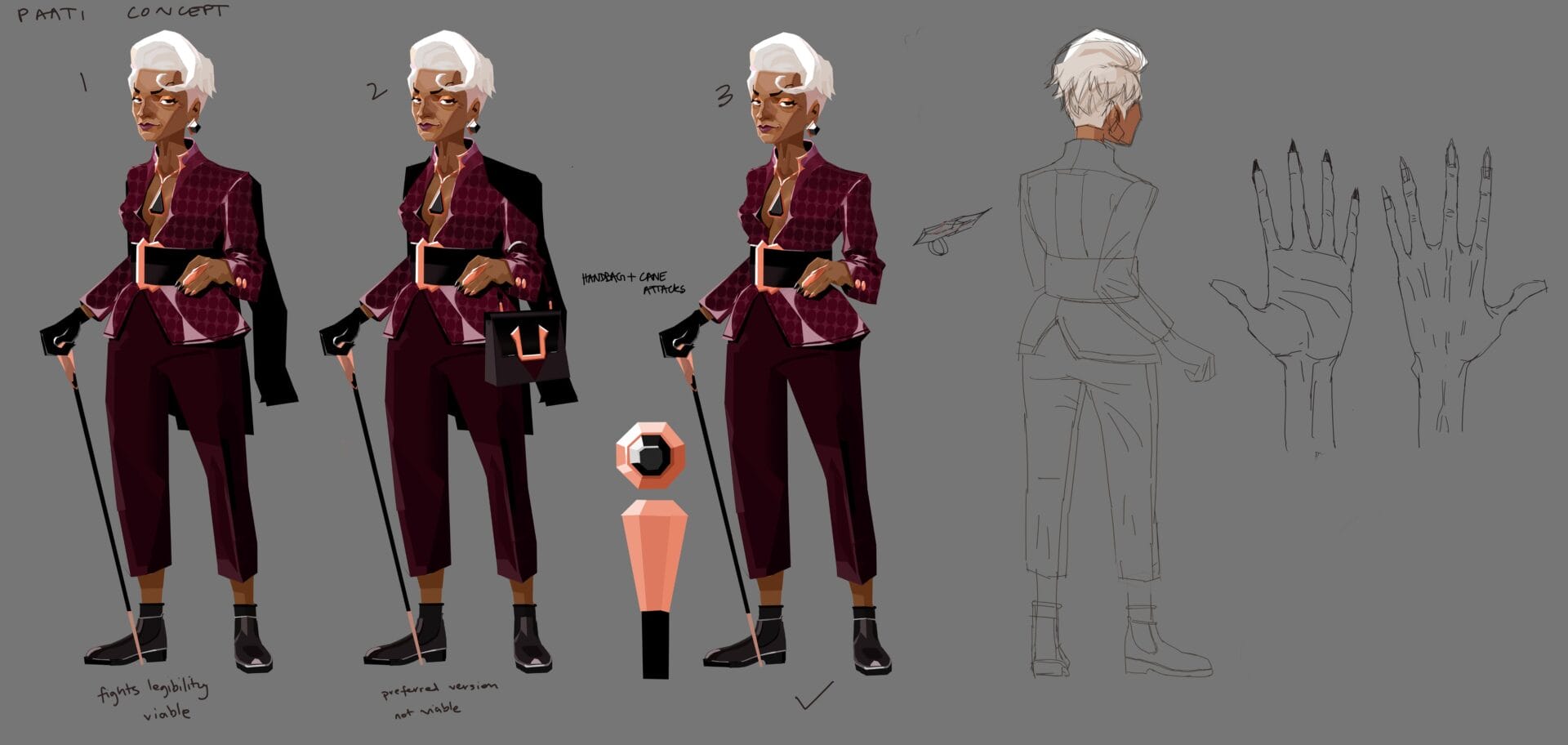
Eka: Paati is very proud and very happy being single. Before we revealed her, we also wanted to think about her perspective. She has very specific cultural wants for Jala, but in terms of queer representation, she doesn’t care if the person Jala marries is a heterosexual man at all. It’s more like, “Oh, they need to be from this place or this class.” Everyone has their biases and it’s not the Western media’s acceptable idea of what that means from South Asian families and queerness.
Cook: Speaking further on representation, I want to talk about Tyler as well because she’s depicted as THE ex of Jala’s that you know you’re going to confront by the end of the game. And it’s clear through her dialogue and her bio in the suitors status page that she’s a trans woman. Was that something the team planned on from the beginning?
Eka: That’s representative of the team. So Tyler as a trans character was something we discussed. The big thing for me when we were casting these characters, I wanted to find representative trans women actors to play Tyler. Finding Christine was a big deal and she sent in a test and we really liked her, and once I talked to her, the first thing she said was, “Tyler is me ten years ago.” And she was just so touched by the experiences. We were like, “Oh shit, okay.”
Cook: That’s when you know you nailed it.
Eka: Yeah, yeah! We were being very specific about her upbringing. After talking to Christine, we ended up rewriting Tyler more in her voice. Sometimes we write a character and we get an actor to match, but sometimes it’s the actor that influences the development of the character. Once you know how someone’s gonna speak and how they’re gonna deliver lines, it was like, “Okay now we can write in her voice.” Casting this game was probably the hardest thing.
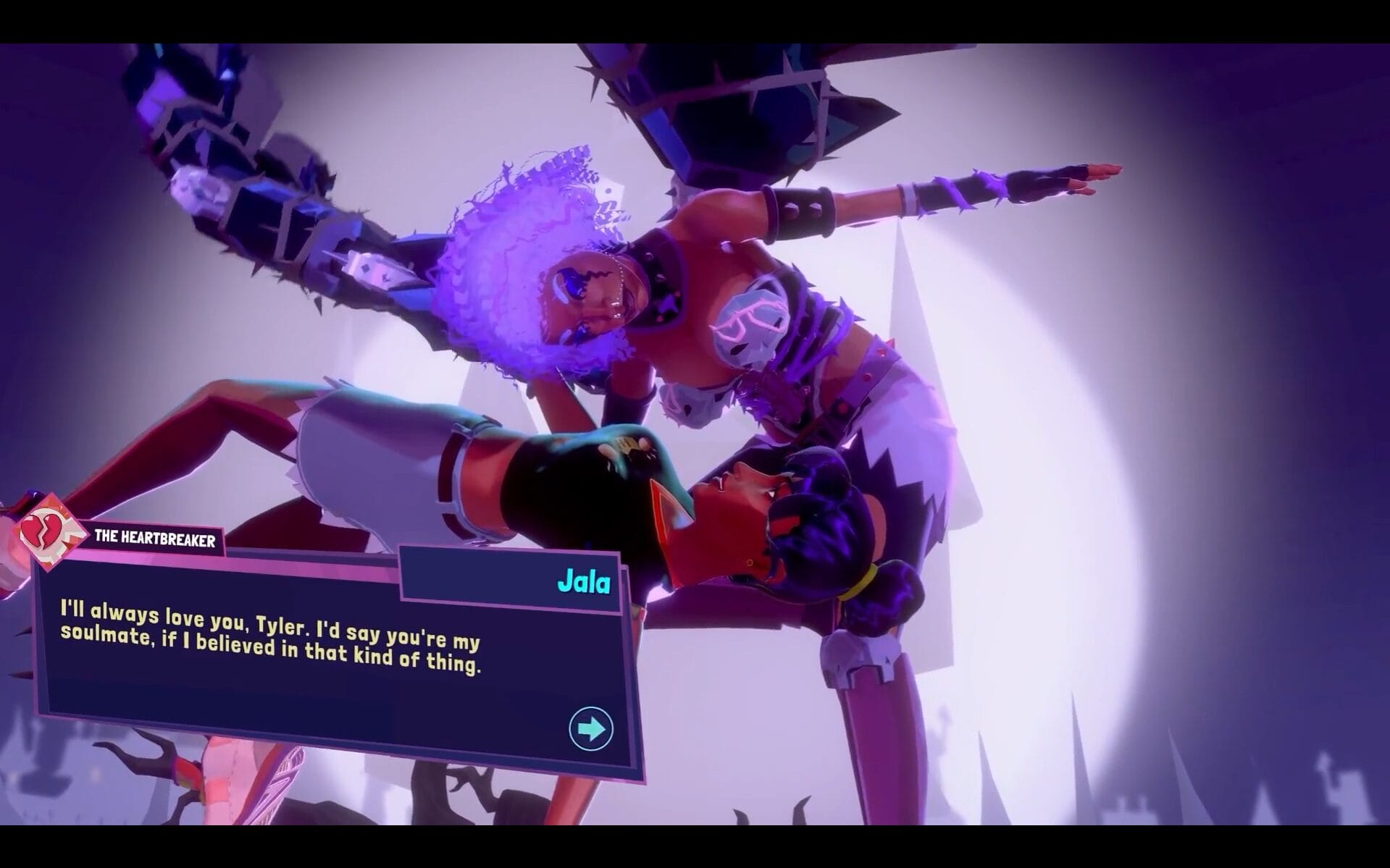
Cook: It did surprise me when I saw Thirsty Suitors it was nearly fully voice acted. Especially for an indie game, that feels like a very ambitious choice.
Eka: It was important because it’s such a character-driven game. There’s so much tone that can come from an actor reading a line. I didn’t want to do any big known names because this was an indie project. I wanted to give folks that usually get one-dimensional characters in bigger things or they have a smaller part… And every single actor was like, “I’ve never read for a character with this much depth or this much representation.” It’s an all brown and black cast. So giving these folks who usually get the side characters or the queer best friend main roles was a big deal for us. And that just really helped bring the game alive as well.
Cook: To zoom out a little bit while we’re on the topic of indies, obviously you have experience in both the indie and AAA space, but what we’ve noticed – and what the world has noticed – is that indie games are the games that are pushing the industry forward when it comes to centering characters of color, immigrants, and characters. Considering your experience, I’m curious if you’ve found the reason for that divide.
Eka: When you try to appeal to as many people as possible, you tend to shave off interesting characters or things that might be like, “Oh, this might upset this group.” So it’s like, this character arc could’ve been interesting but to serve the story and to make sure to not piss anybody off, we get a very vanilla or bland oatmeal version of the character to play it safe. In the indie space, we don’t need to sell as many units. We’re going to be more specific. And when we’re talking about AAA teams, we’re talking about hundreds and thousands of people and then someone has to fund it and they have to get that approved. What they consider risks, which I think is wrong, they end up filing down the interesting parts. Indie games are interesting because they’re not completely polished in a way where everything is perfectly presented and pristine. It feels hand-built with purpose or there’s a sense of authorship from someone that has a vision for a game. We can take more chances because we don’t have to sell a gazillion copies to survive.
Cook: Of course I played through the entirety of Thirsty Suitors, but I also got my hands on Dosa Divas at Summer Game Fest and that seemed to carry over a lot of similar traits, not just regarding the gameplay and colorful aesthetic, but also in the focus on food, family, and community. It struck me as the kind of game we need nowadays considering how hostile some spaces have become especially towards immigrants and LGBTQ people.
Eka: Yeah, that was an interesting time. I mean, Summer Game Fest when you played through Dosa, we were in Downtown LA demoing these games to press and other folks, while outside there were ICE raids and protests and it’s like…we’re making a game about immigrants. It’s really weird because this country is made of immigrants. Talking about Dosa and thinking about why food is important, especially ethnic or immigrant food, is because the first way someone experiences a culture is through food and people tend to be more accepting of the food than the people that make it. There’s other things in the game too which is that people have forgotten how to do things because they’re so reliant on automated, simplified, or corporatized methods of food or delivery. Both sisters in the game are chefs and they’re in a world where people have forgotten how to cook. Reminding people of local food, history, culture, and why that’s important is the goal of that game too.
Cook: I mean, does it worry you to release a game that touches on so many pertinent topics?
Eka: I mean, I’m afraid but I said fuck it. I moved to the US when I was eight. I love living here and there are aspects of it that are troubling now as I’m raising two boys. The intersectionality for them because they’re biracial… Before the pandemic, we would go back to Sri Lanka just to be able to connect with their culture, but especially now when it’s such a big deal, I’m proud to be an immigrant. I’m proud to provide jobs. People are afraid of things they don’t understand so if we can make games like Thirsty Suitors or Falcon Age or Dosa Divas where we can try to connect with people who might not be familiar with the culture in an entertaining way and still get some message across, I’m all for it. Yes, it does make me think, “Do I want to travel outside the US? What’s gonna happen?” Those are real worries. But also I feel this is the best time to be making something like this.
Cook: Talking about the things you hope people will take away from your games, what’s something you took away from creating your own games, especially Thirsty Suitors, that you might be bringing into the development of Dosa Divas?
Eka: I think it comes back to the specificity. We would talk about this every single day. Because there isn’t a lot of representation of what we’re trying to do with South Asian culture and overlap of queerness, if we’re being very specific with each character, are we going to piss people off that are like, “Well, that’s not how it is here. That’s not how it is to me.” So there was this push and pull of, “Do we pull back and make it more generalized? Do we be more specific?” We were talking back and forth, Meghna and I, and we were like, “Okay. We’re not going to be able to please everybody. That is just an impossible thing to do. So, let’s just talk about the things we care about and hopefully someone else will care about it too.”
Cook: One last question: a lot of studios wonder how, and sometimes struggle, to get representation right, but it seems like a process that Outerloop has managed to find some answers to. What’s your secret?
Eka: It comes back down to the team and our own experiences – things we can speak to in a confident way. We try to focus on, “How do we deal with death? How do we deal with this relationship with your parent? How would we deal with it? How do we feel about it?” And then if we’re honest about our feelings, the hope is that comes through in the character. So I don’t know if that’s the secret, but that’s been our approach. And lots of therapy. I think lots of therapy to unpack a bunch of things. Not that making games is therapy because it’s not, but being able to speak to things I couldn’t speak to my parents or siblings directly through art has been a great outlet and an interesting way to talk about things.
Want to stay in the loop on what Outerloop Games is up to? Visit Outerloopgames.com, check out the studio on Bluesky, or follow Chandana Ekanayake on LinkedIn for updates.

